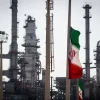CEO of National Iranian Gas Company at the Press Conference of the 29th International Oil, Gas, Refining, and Petrochemical Exhibition Stated:
Integrated Management and Targeted Planning Are the Keys to the Stability of the Country’s Gas Network
The CEO of the National Iranian Gas Company, referring to significant progress in gas trade development and international cooperation, announced the signing of new contracts with neighboring countries and the preparation of export facilities. He emphasized that these actions are an important step in strengthening the country’s energy economy.
According to the Public Relations of the National Iranian Gas Company, Saeed Tokli, Deputy Minister of Oil and CEO of the National Iranian Gas Company, during the press conference on Friday, May 9th, at the 29th International Oil, Gas, Refining, and Petrochemical Exhibition, congratulated the birth anniversary of Imam Reza (AS) and the Decade of Dignity. He appreciated the efforts of those involved in organizing the exhibition and, referring to his recent meetings with representatives from Russia and some Asian countries, said: “Many representatives of Asian countries have praised Iran’s performance under the current conditions and after 45 years of sanctions and restrictions, and this has been reflected widely on social media.”
He continued: “We must be grateful that despite the sanctions, the oil, gas, petrochemical, and related industries have become more agile, resilient, and prepared.”
A Winter with Unprecedented Records
Tokli pointed to the special conditions of last winter, stating: “This season was unique in terms of duration, intensity, and extent, and several important records in the country’s gas industry were broken.”
The Deputy Minister of Oil for Gas Affairs added: “For the first time, the gas production record was broken, and dry gas production in the national gas network reached 880 million cubic meters per day. This achievement was the result of integrated and coordinated management within the Ministry of Oil.”
According to Tokli, the increase of 30 million cubic meters in rich gas production and 21 million cubic meters in natural gas production in less than three months is another example of this managerial performance.
Sustainable Energy Supply in Critical Conditions
The CEO of the National Iranian Gas Company referred to the severe cold in November 2024 that reached 11 northern provinces, with temperatures dropping to minus 12 degrees Celsius. He added: “While the country’s oil and gas reservoirs were not in an optimal state, energy consumption management and supply were carefully and continuously pursued.”
Tokli noted that autumn 2023 was the warmest autumn in Iran in the past half-century, according to the Meteorological Organization, and consumption had increased with the addition of 900,000 new subscribers. However, thanks to God and the efforts of all gas industry staff, the network was managed without any outages.
He mentioned a 350 million cubic meter imbalance in gas supply and stressed that this problem results from several years of imbalance between production and consumption. Despite these challenges, the National Iranian Gas Company has grown stronger compared to last year.
Key Measures to Address Gas Imbalance
He highlighted important measures taken last year to reduce the gas imbalance, including the commissioning of the 17th booster station’s spare unit, increasing gas transmission capacity by up to 50 million cubic meters in the eastern corridor, and deploying 30 turbo compressors at border points. These actions were examples of accepting engineered risks that have led to significant success.
The CEO also appreciated the early fuel management meetings held by the Minister of Oil, stating that these played a decisive role in company readiness and coordination among various ministry departments. He thanked God that despite all difficulties, no disruptions occurred in the stability of the country’s gas network.
Future Plans: Infrastructure Improvement and Consumption Optimization
Tokli explained the company’s future plans, saying: “Although this year’s conditions are not better than last year, the National Iranian Oil Company is increasing raw gas production.”
He referred to the low efficiency of common heaters in the country, noting: “Currently, about 20 million domestically produced heaters are in use, with an efficiency of around 60 to 70 percent. However, according to the Economic Council’s resolution, the production of heaters with over 85 percent efficiency is underway, and contracts have been signed.”
Tokli added: “Fortunately, with government support and divine grace, the supply and distribution of these high-efficiency heaters have begun and will replace old heaters free of charge for consumers. The only requirement is to hand over the old heaters to the National Iranian Gas Company.”
He emphasized that consumption management is not solely the Ministry of Oil’s responsibility; other bodies, including the Ministry of Industry, Mine, and Trade, must also take serious action. He stressed the need to prevent the production of low-efficiency heaters and said this requires media and public demand directed at responsible institutions.
Increasing Network Stability and Early Major Repairs
Tokli mentioned the start of early major repairs, expressing hope that maintenance programs will be completed by late September to prepare for the cold season.
He added: “Colleagues in Asaluyeh, booster stations, and high-pressure pipelines, in cooperation with provincial gas companies, are working to prepare infrastructure for the cold months.”
Development of Gas Trade and International Cooperation
The Deputy Minister of Oil for Gas Affairs referred to gas trade development programs, stating: “According to the Seventh Development Plan, appropriate actions have been taken in gas trade.”
He announced cooperation with Turkmenistan and Russia in the gas sector, the review of new contracts with neighboring countries, and the preparation of export facilities and equipment. He said: “The gas swap contract between Turkmenistan, Iran, and Turkey, which became operational late last winter, is the first G2G (government-to-government) contract and is currently active. Turkmenistan, as the holder of the largest onshore gas reservoir in the world and sharing the longest border with Iran, is an important partner in energy supply.”
Tokli also spoke about gas cooperation with Russia, mentioning several negotiations and a recent visit by the Oil Minister to Russia. They are currently reviewing the price and payment mechanism for the first phase of a project with an annual capacity of 55 billion cubic meters and hope to reach a final agreement to start gas flow.
He also referred to the first technical specialized event for gas refinery operators in the country, which experts say has no parallel worldwide and aims to enhance skills and technical knowledge.
Summary and Future Outlook
At the end, the CEO of the National Iranian Gas Company emphasized integrated and coordinated management, increased energy efficiency, infrastructure development, and gas trade. He assessed the company’s performance in recent months as successful and said: “These actions have played an important role in sustainable energy supply, and I hope that by continuing this path, the country can better manage its energy resources and achieve sustainable development in the gas industry.”






